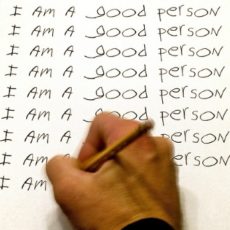LIE: God only grants salvation to those who have faith in Jesus TRUTH: Our faith in Jesus is the awakening we need to realize our already-won salvation This article is written primarily from the perspective of individual salvation, but I do see the validity of social and cultural structures that
What is hell?

I will not pretend to have solved the mystery of hell. Just as we cannot possibly envision the new heavens and earth, neither can we fully envision hell, whatever it is. But the truth is, the Word does give us the broad contours, enough to say with confidence that hell is NOT the caricature that we’ve been told.
LIE: Virtual church services are an acceptable substitute for in-person church services

Here in March 2021 in America, most churches are still either shut down entirely, or, if they are meeting in person, meet with a reduced capacity, or meet virtually or by virtue of a livestream broadcast, or a combination thereof. Very few have reopened to pre-pandemic occupancy; most continue to follow their state or local government’s emergency health orders.
After an entire year, why do churches continue to follow these health orders?
Simply put, it’s faith — but not faith in God. Rather, it’s faith in the institutions of government, media and medicine . . .
LIE: Worship is an experience of God’s presence, part 2

How can we actively participate in God’s instruction of worship? The Lord gave Israel just such an instructional roadmap in the proclamation of the Ten Commandments, especially the first four commandments which comprise the first tablet concerning our walk with God. Let’s take these one by one and ask the question: How does this commandment teach us to worship?
LIE: Worship is an experience of God’s presence, part 1

Lie: Worship is
an experience of God’s presence.
Truth: Worship is
a response to God that results in the arrangement of our lives around God.
I can’t think of any more important subject to get right
than the subject of worship. As Christians we all would agree that worshiping
God – whatever it is – is supremely important. And most would also agree that
getting this right is the one prerequisite to getting most everything else right. But the real disagreement
enters around what worship fundamentally is.
Too often we assume that we know this but the truth is that we’re confused.
Worship is such a broad and profound subject that there are simply too many
ways to get this wrong or woefully incomplete. Until we can better understand
the nature of worship it won’t really matter to talk about how we worship, which is precisely where most of the disagreement
normally occurs.
LIE: I can safely ignore God
Lie: I can safely ignore God.
Truth: I can ignore God, but not safely.
We’ve become good ignorers – those who’ve learned to ignore things extraordinarily well. It seems we’ve been forced to become so as a matter of survival, especially those of us crammed into cities, stacked in apartments, employed in corporate parks where 95% of the faces that continually pass us in the halls pass as strangers – we assiduously look down or away and without a drop of conscience.
And think of all the ads, the background music/Mazak, the SMS texts, the Instagram feeds to which we’ve frivolously subscribed, the robo-calls, the signs, the spam, the junk mail, the news and information – it never stops coming. To have any chance . . .
LIE: Passive use of the internet is harmless, part 1

Lie: Passive use of the internet is harmless.
Truth: Passive use of the internet is participation in hidden, mass, personal data collection, analysis, and control and insidiously leads to idolatry.
At the time of this writing in 2018, the majority of people I see walking about carry their smartphone in hand. They’re either texting, surfing, watching, talking or just having it at the ready. And if it’s not in hand it’s not far from them. This obsession is well documented, both the good and the bad.
LIE: Passive use of the internet is harmless, part 2
LIE: Prayer is useless

Lie: Prayer is useless, a waste of time.
Truth: Prayer will eventually fill all of our time.
I have been driven many times to my knees by the overwhelming conviction that I had absolutely no other place to go. — Abraham Lincoln
I hear this lie – prayer is useless – whispered in my ear as a convenient excuse to avoid God when I’m not willing to deal with the bigger lies like: God doesn’t exist; God doesn’t care, or I don’t need God. I’m also tempted to believe this lie when I’m not dealing with the sin in my life: hypocrisy if I do pray, condemnation if I don’t (more on the reasons we fall for this lie later). The real tragedy is that so many Christians never experience . . .
LIE: The Christian life is a matter of understanding and following biblical principles

Lie: The Christian life is a matter of understanding and following biblical principles.
Truth: The Christian life is a matter of understanding and following Jesus Christ.
It may not appear to be so, but there is a world of difference between those two statements. But since Jesus is physically unseen and unheard and only spiritually apprehended, the two may blur if we’ve not been properly introduced to the Person, Jesus.
In our eagerness as evangelicals to make converts, we push too many, even manipulate some by simple, rote prayers and formulas to become a Christian. But these souls were never really taught to hear for themselves the call of Jesus on their lives. Becoming a Christian is not simply . . .

